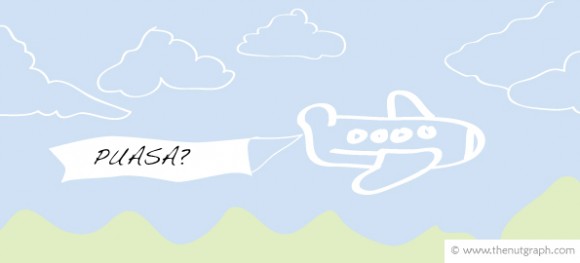
IT so happened that this Ramadan I had to take an 18-hour flight to Vancouver to attend the wedding of a close friend’s only daughter. I wouldn’t normally choose to travel during Ramadan but it was a rare opportunity to see my friend’s happiness as she saw her daughter married off.
I did tell a few friends I was going but still, there were several text messages and emails I received during my trip that I had to reply by saying that I was away in Canada. Back came the quick query: how is fasting in Vancouver?
Ordinarily, I suppose fasting in Vancouver would be pretty routine. But I had traveled a long way to attend one event and then pretty much turned around to fly home again. As far as I knew from the Quran, this exempted me from fasting.
In the Surah Al-Baqarah verse 185, God says, “It was the month of Ramadan in which the Qur’an was [first] bestowed from on high as a guidance unto man and a self-evident proof of that guidance, and as the standard by which to discern the true from the false. Hence,whoever of you lives to see this month shall fast throughout it; but he that is ill, or on a journey, [shall fast instead for the same] number of other days. God wills that you shall have ease, and does not will you to suffer hardship.”
But although this principle is well known, it seems almost inconceivable to Muslim Malaysians that any Muslim may not fast, even under circumstances where he or she may be exempted. Was I supposed to lie and say that fasting in chilly Canada was ok and commit a sin instead? In a larger context, why does there seem to be increasing social pressure to fast as evidence of one’s faithfulness to God? Or the expectation that non-Muslims have to defer to Muslims by not eating in front of them?
What’s proof of piety?

Some Muslims read the entire Quran during Ramadan
It seems to have become a trend of late for Muslims in Malaysia and perhaps also in nearby countries to prove their piety during Ramadan not only with fasting but with other religious acts. There are people who go for terawih prayers every night for instance. Or who read the entire Quran during the month.
I have no issue with any of these. But I do take issue with the notion that to be a perfect Muslim during Ramadan, one must therefore remove all temptations from our view and become offended at the sight of other people eating. As Indonesian writer Goenawan Mohamed points out, not only do people who fast have to be respected as special (because fasting is viewed as a big sacrifice) but others too have to sacrifice for them.
And yet, isn’t Ramadan about restraint? “O you who have attained to faith! Fasting is ordained for you as it was ordained for those before you, so that you might remain conscious of God.” (Surah Al-Baqara, verse 183). It means to be conscious that God necessitates that one does not act unwisely and without thought. If we face temptation, then we can withstand it because we are conscious of God.
Yet, some Muslims feel offended when others, particularly those of a different faith, eat in front of them. Unlike many countries in the Middle East, life does not stop dead in Malaysia during Ramadan and food outlets remain open because we recognise that there are still people who need to eat, a fact that foreign diplomats who have previously been stationed in the Middle East have remarked on.
However, we Muslims seem to be increasingly mistrustful of ourselves in the face of this traditional openness. Some almost view it as an affront to our delicate natures and perhaps, as Goenawan points out, a disrespect for our ‘sacrifice’. But fasting is not meant to be a sacrifice because we do it for God. God wants us to remember those who, due to want, are ‘fasting’ everyday.
Is there therefore any reason for the school principal from Bukit Selambau, Kedah, to hurl racist epithets towards non-Muslim students who were eating? Indeed, to purists, it could be said that such harsh words would immediately disqualify one’s fast.
Policing faith
It also does not make sense to have signs in restaurants warning Muslims that if they eat during the day they will be liable for a fine.
There is no punishment prescribed in the Quran for those who don’t fast except that they are enjoined to do charitable works and to do good. The idea of Ramadan is to become aware of those in need and therefore we need to show such awareness through acts of charity and compassion.
Surah Al-Baqara continues, “But whoever of you is ill, or on a journey, [shall fast instead for the same] number of other days; and [in such cases] it is incumbent upon those who can afford it to make sacrifice by feeding a needy person. And whoever does more good than he is bound to do does good unto himself thereby; for to fast is to do good unto yourselves — if you but knew it.”
Yet, Islamic laws in Malaysia criminalise non-fasting during Ramadan for Muslims. Is it nothypocrisy if we will only follow our religious obligations when forced to do so by law?
And so, more and more, Ramadan is about excess rather than restraint. Breaking fast buffets are extravagant and expensive. Wastage is the norm. Even terawih prayers are occasions to eat in between devotions. Moments for quiet reflection are few and far between.
I grew up fasting and do it without much fanfare every year. But increasingly I feel the overbearing force of social pressure to fast as a public act, rather than a private one. To prove myself a Muslim, I must now convince other Muslims, not God alone.
courtesy of Nut Graph




No comments:
Post a Comment
Note: Only a member of this blog may post a comment.